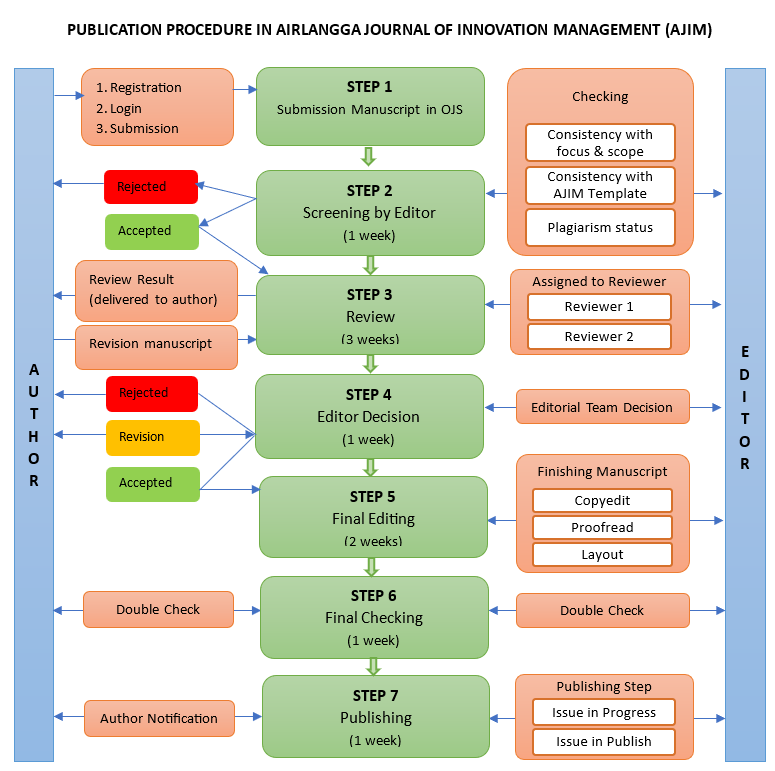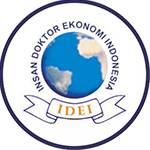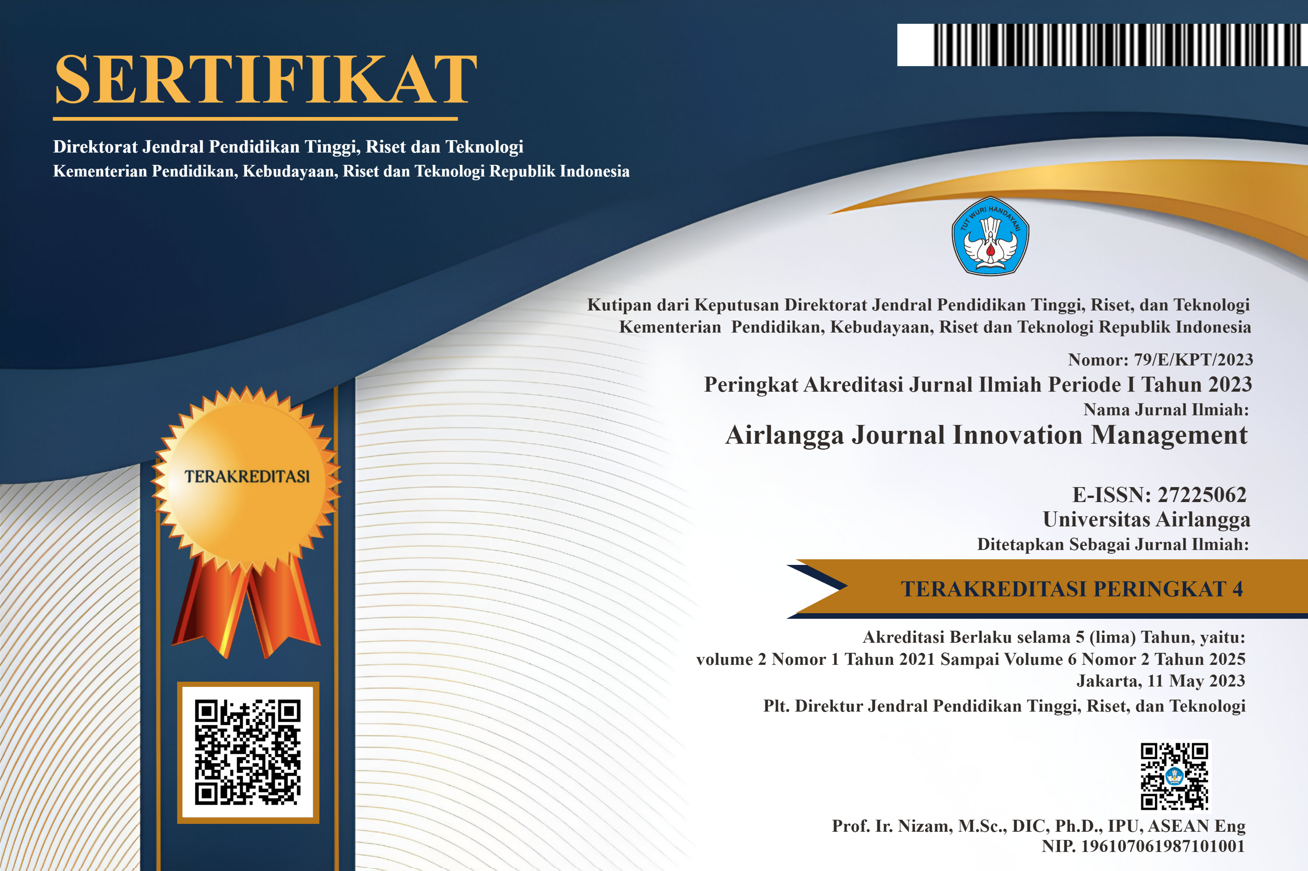- Focus and Scope
- Section Policies
- Peer Review Process
- Publication Frequency
- Open Access Policy
- Archiving
- Article Processing Charge
- Publication Ethics
- Plagiarism
- Article Submission Charge
- Copyright Transfer Form
Focus and Scope
-
Airlangga Journal of Innovation Management (AJIM) aims to link the research and practice of innovation management. AJIM adopts a multidisciplinary approach to addressing the many challenges of managing innovation.
-
AJIM encourages the submission of papers addressing the multidisciplinary nature of the innovation process, combining principles and concepts originating from various scientific fields, from social sciences to technology research and development. AJIM encompasses all phases of technological innovation, from the conceptualization of new technology-based products/services to commercialization.
The multidisciplinary perspective associated with AJIM means that papers should cover, but are not limited to, the following areas:
- Product Innovation Management: Research on the development and commercialization of innovative products, including strategies for managing product life cycles and enhancing market adoption.
- Business Anthropology: The study of cultural and social factors influencing business practices, organizational behavior, and consumer decision-making.
- Business Model: Exploration of new and existing business models, value creation strategies, and sustainable revenue generation approaches.
- Information Management System: Research on digital transformation, data management, and the integration of information systems in business processes.
- Start-Up Business: Studies on entrepreneurial ventures, growth strategies, funding mechanisms, and sustainability of start-ups in various industries.
- Agile Business: Analysis of agile methodologies in business operations, project management, and organizational adaptation to rapid market changes.
- Entrepreneurship: Examination of entrepreneurial mindsets, business creation, risk management, and innovation-driven enterprises.
- Innovation Economics: Economic theories and empirical studies related to innovation, technological advancements, and their impact on markets and society.
- Industrial Engineering: The application of engineering principles to optimize production processes, supply chains, and operational efficiency.
- Market Research: Consumer behavior analysis, competitive intelligence, and market trend forecasting to support business decision-making.
- Technology and Science Innovation: Research on cutting-edge scientific and technological breakthroughs, their applications, and commercialization strategies.
- Creativity and Improvisation: Studies on creative problem-solving, innovation management, and the role of improvisation in business success.
Section Policies
Articles
Peer Review Process
Review Process in Airlangga Journal of Innovation Management includes:
2. Screening by Editor (1 week)
3. Review (3 weeks)
4. Editor Decision (1 week)
5. Final Editing (2 weeks)
6. Final Checking (1 week)
7. Publishing (1 week)

- Checking if there is any manuscript submission on the website.
- If there is availability, download the original file and supplement files (usually consisting of a cover page & declaration page).
- The original file is forwarded to the admin secretary for the Turnitin application (check plagiarism and AI detection). If the author does not include the supplement files, they must be requested from the author via email (the request email is sent along with the pre-review in route 2). Note: author declaration is not compulsory. Meanwhile, if the author already includes the supplement files, forward the files to the admin journal for archiving.
- Checking the quality content of the manuscript (based on the manuscript template of the AJIM guide for authors).
- Checking the plagiarism percentage of the manuscript by the admin secretary and SECTION EDITOR appointment.
- Assigning a checklist for pre-review whether the manuscript is compatible with the manuscript template of the AJIM guide for the author.
- Send back the pre-review to the author for revision along with a cover page request (if there is not any), tables, and figures in JPG/JPEG format with HD quality for layout needs. The deadline for pre-review revision is 3-4 days based on whether it is a minor or major revision. Note: If it is already the due date, remind the author every day.
- If the author already sends the revision, the editor team gets to decide whether to accept, reject, or revise the manuscript again before forwarding it to the reviewers.
- Revised the manuscript again before forwarding it to the reviewers.
- SECTION EDITOR looks for the reviewers. SECTION EDITOR usually already has their own reviewer, but if SECTION EDITOR is having a hard time to choose the reviewers, it can be helped by looking at the reviewers recommendations whom the author gives in cover page form.
- Reviewers consist of 2 people at minimum, one of whom is Asia and the other one is a foreigner, or all reviewers are foreigners.
- The review process is conducted in 10 days maximum. The reminder is done on D-3 and D-day.
- Monitoring the email flow between the SECTION EDITOR and reviewers to help remind the reviewers if the SECTION EDITOR forgets or has another business.
- After the review process is done, the SECTION EDITOR sends the manuscript back to the author for revision (make sure to wait until 2 reviewers are done reviewing). The deadline for the author to revise the manuscript is 10 days.
- Make sure the reviewers have already completed the form review from the SECTION EDITOR since this form will be used to submit the data on the website and to list the reviewers for the archive.
- After the manuscript is revised by the author, the SECTION EDITOR sends it back to the reviewers to check if it is really revised accordingly.
- SECTION EDITOR forwards the manuscript to the editor to decide through an internal meeting by the editorial team of AJIM, and based on the consideration from reviewers whether it is worth being published, it needs revision again, or it is fully rejected.
- If the manuscript needs to be revised again, the due date is 5 days maximum.
- The accepted manuscript is finally edited by the copyeditor.
- The manuscript is proofread by professional proofreader(s) and then sent back to the author for revision.
- After that, the manuscript goes through the layout process based on AJIM's publication standard, galley changes to a PDF file, and links the references in the content PDF
-
Final checking is done by the author and AJIM crew to double-check the manuscript before it is published.
- Final checking is done by the author and AJIM crew to double-check the manuscript before it is published.
- If the manuscript does not need a revision, it will be grouped into the issue in Publish (the manuscript published is in accordance with the volume and issue).
All reviewing processes are in double-blind peer review and managed by the editor in the Open Journal System (OJS).
Publication Frequency
Since Vol. 5 No. 1 2024, starting in March 2024, Airlangga Journal of Innovation Management has been published quarterly (4 times every year), namely in March, June, September, and December, with 12 articles per issue since Vol. 5 No. 1 2024.
Open Access Policy
The journal allows readers to read, download, copy, distribute, print, search, or link to the full texts of its articles and allows readers to use them for any other lawful purpose other than commercial use.
This journal provides immediate open access to its content on the principle that making research freely available to the public supports a greater global exchange of knowledge.

AJIM by UNAIR is licensed under a Creative Commons Attribution-NonCommercial-ShareAlike 4.0 International License.
Archiving
This journal utilizes the CLOCKSS system to create a distributed archiving system among participating libraries and permits those libraries to create permanent archives of the journal for purposes of preservation and restoration.
Article Processing Charge
- Article Submission Fee: IDR 0.
No charge for manuscript submission.
- Article Processing Charge: IDR 0.
No charge for Article Processing Charge (APC).
Publication Ethics
AJIM, we are dedicated to upholding the highest standards of publication ethics in order to foster a responsible and ethical research environment. Our commitment lies not only in disseminating valuable knowledge but also in maintaining integrity, transparency, and ethical behavior throughout the publication process. To ensure this, we have developed comprehensive publication ethics guidelines, which adhere to the principles set forth by the Committee on Publication Ethics (COPE).
AJIM is dedicated to maintaining the highest standards of publication ethics to create a responsible and ethical research environment. We are committed to not only sharing valuable knowledge but also upholding integrity, transparency, and ethical conduct throughout the publication process. To ensure this, we have developed comprehensive publication ethics guidelines that align with the principles established by the Committee on Publication Ethics (COPE).
Ethical Issues arising in scholarly publishing
- Plagiarism
- AI detection
- Redundant publication (dual publication)
- Self-plagiarism (sometimes known as text recycling)
- Authorship issues
- Coercive citation
- Defamation/libel
- Fabricated data
- Unethical research and testing
- Conflicts of interest
Basic principles
Authors submitting works to AJIM warrant the following:
- Their article/chapter is original;
- The work has not been submitted elsewhere and is not under consideration with any other publication;
- The work does not include libelous, defamatory, or unlawful statements;
- Permission has been cleared for any third-party material included;
- Proof of consent has been obtained for any named individuals or organizations;
- Authorship has been agreed upon prior to submission, and no one has been ‘gifted' authorship or denied credit as an author ("ghost authorship”).
Authors submitting works to AJIM publications do so on the understanding that if it is discovered that these basic principles have not been adhered to, action will be taken following the COPE guidelines and may result in one of the following correction notices.
Erratum: This generally refers to a production error, which has been introduced during the publication process. If an erratum is issued, it will appear on the abstract of the online version of the paper to ensure full visibility. The erratum will also appear in the hard copy of the next volume or issue of the publication.
Corrigendum: This generally refers to an author error or oversight prior to the paper's submission to the publication. If a corrigendum is issued, it will appear on the abstract of the online version of the paper to ensure full visibility. The corrigendum will also appear in the hard copy of the next volume or issue of the publication.
Retraction notice: A retraction notice will be issued in serious cases of ethical misconduct or where the research is seriously flawed and misleading. In normal circumstances, the paper will remain in the online version of the journal or book. A retraction notice will appear on the online version of the paper. The retraction notice will also appear in the hard copy of the next volume or issue of the publication.
Note of clarification: A note of clarification will be used when a point needs to be emphasized or clarified in the text, but it does not constitute a correction. Please note that any correction has to be highlighted as a stated erratum, corrigendum, or note of clarification, and the text cannot be amended. This is to make sure that the reader is aware of any changes to the text that they might have cited or referred to in their subsequent research or practice.
Expression of concern: In cases where a conclusion is unclear or where we are unable to make a fair decision due to conflicts of interest or lack of information, we will publish an expression of concern regarding the paper. An expression of concern will appear on the online version of the paper at the abstract level to ensure visibility for all readers, including non-subscribers.
Please note that for legal reasons or when an article or chapter forms evidence in an independent hearing, we may not be able to take action until all matters have been fully resolved.
In addition, please note that AJIM reserves the right to not proceed with a case if the complainant presents a false name or affiliation or acts in an inappropriate or threatening manner towards AJIM editors and staff.
Plagiarism
The core values of AJIM include originality. Therefore, we do not tolerate any article with plagiarism issues. We use Turnitin as as our screening tool to detect the similarity rate of the manuscript, and a manuscript is considered acceptable if the similarity rate is less than 25%. The result of the preliminary plagiarism check is forwarded to the Section Editor, while plagiarism may also be detected during the review and revision processes. The final plagiarism check will be conducted after the author has finalized the revised manuscript. When plagiarism is identified, the Section Editor is responsible for reviewing the manuscript, and the Editor-in-Chief will make the final decision on a case-by-case basis
AI Detection
AJIM applies a maximum limit of 30% AI detection score in the manuscript review process. This aims to ensure that the submitted work is the original result of the author and not fully generated by artificial intelligence (AI). Manuscripts that exceed the AI detection limit will be immediately rejected to evaluate the level of AI engagement and compliance with publication ethical standards.
Redundant publication (also known as dual publication)
Authors are expected to submit original, previously unpublished content to AJIM publications. It is an unacceptable academic practice to submit to more than one journal at the same time. Authors are expected to wait until receiving a decision from one journal before submitting to the next.
AJIM will follow the Committee on Publication Ethics' flowcharts in cases of alleged redundant publication in submitted or published articles.
Text recycling (sometimes known as self-plagiarism)
Authors are expected to submit original content to AJIM publications. It is only acceptable for research to be repeated if it leads to different or new conclusions or for comparisons with new data. In all cases, it is important to reference the previously published work.
If any element of the work has been published previously, you must ensure that this work is fully referenced and state it at the point of submission so that the Editor may make a fully informed decision.
Authorship issues
In multi-authored papers, it is important that all authors who have made a significant contribution to the paper are listed. Those who have provided support but have not contributed to the research should be acknowledged in an Acknowledgements section.
Authorship issues fall into three main types:
- The exclusion of a contributor from the list of authors
- The inclusion of a named person who has not contributed to the paper or does not wish to be associated with the research
- The order of the authors on the paper and the level of contribution that they have made to the paper.
AJIM will endeavor to facilitate a resolution to an authorship dispute. However, as the research process is undertaken prior to the paper being submitted to AJIM, it is not possible for AJIM or the editors to comment on the level of contribution by each author. Please refer to the Committee on Publication Ethics' flowcharts for the processes that AJIM follows in cases of authorship disputes in submitted or published articles.
If the matter cannot be resolved, AJIM will refer the matter to the authors' institutions.
If all authors agree to a change to authorship on a paper, this will be presented as a corrigendum. A retraction notice will only be published when requested by all authors.
Coercive citation
During the peer review process, it is typical for authors to be directed by reviewers to papers that further develop and improve the author's ideas.
Whilst there may be legitimate occasions where it is necessary to reference other publications, AJIM regards ‘coercive citation' (i.e., where a reference is included as a condition of acceptance or without academic justification) as unethical and does not condone this kind of behavior.
Defamation/libel
AJIM requires that authors obtain written "proof of consent" for studies about named organizations or people.
If inaccurate, unsubstantiated, or emotive statements are made about organizations or people in a submitted paper, AJIM reserves the right to request changes to the text from the author or to reject the paper prior to publication.
Critiques and reviews of products and services are acceptable, but comments must be constructive and must not be made maliciously.
If statements have been made in a paper that is published by AJIM and found to be defamatory, a retraction notice will be published. In some cases and when legally required, the paper will be withdrawn from the online version of the journal or book. An apology will be published in a forthcoming issue of the journal or volume of the book.
AJIM will advise all authors of case studies to inform the subject (person or organization) and to seek permission. If AJIM considers that the study could be potentially libelous, we will require written proof of consent before placing the paper into the production process.
Fabricated data
Please refer to the Committee on Publication Ethics' flowcharts for the processes that AJIM follows in cases of fabricated data in submitted or published articles. As the research is conducted prior to the paper being submitted to an AJIM journal or book, it is not possible for AJIM or the editors to adjudicate in all cases. We will endeavor to facilitate a resolution and will refer the matter to the authors' institutions when appropriate.
Conflict of interest
All conflicts of interest should be declared by the author, editor, or reviewer.
In all cases, AJIM will:
- Act professionally and efficiently.
- Be fair and objective.
- Always approach the accused party to establish their position before making a decision or committing to a course of action.
- Ensure that we provide sufficient time for all parties to respond.
- Keep all parties informed of decisions, including the copyright owners, editors, and authors.
- As members of the Committee on Publication Ethics, follow the processes highlighted in the flowcharts presented by COPE.
- It is AJIM's responsibility to protect authors' moral rights (to be acknowledged as the author and not to be misrepresented) and to ensure the correct record of the literature.
AJIM reserves the right to withdraw and rescind any acceptance should a case of ethical misconduct be discovered prior to publication.
It will not be possible to please all parties in every case. Following a fair and considered process, the final decision in any disputed case will rest with the editor and AJIM.
Grievance procedure
The following complaints procedure outlines the process for addressing grievances by authors whose articles are rejected for publication or who have concerns about the way their paper has been handled:
- The grievance must be submitted in writing to the editor of the journal;
- The grievance will be considered by the journal editorial team.
- The grievance will be acknowledged within 10 days of receipt and aimed to be resolved within 30 days.
- The decision will be in writing and will be final.
Article Submission Charge
- Article Submission Fee: IDR 0.
No charge for manuscript submission.
- Article Processing Charge: IDR 0.
No charge for Article Processing Charge (APC).
Copyright Transfer Form
Please complete and sign this form and send it back to us with the final version of your manuscript. It is required to obtain written confirmation from authors in order to acquire copyrights for papers published in Airlangga Journal of Innovation Management (AJIM)























